The Supreme Court Must Be Stopped
The court is fundamentally antidemocratic—and the only way to limit the damage it can do is to reduce its power, budget, and lack of accountability.
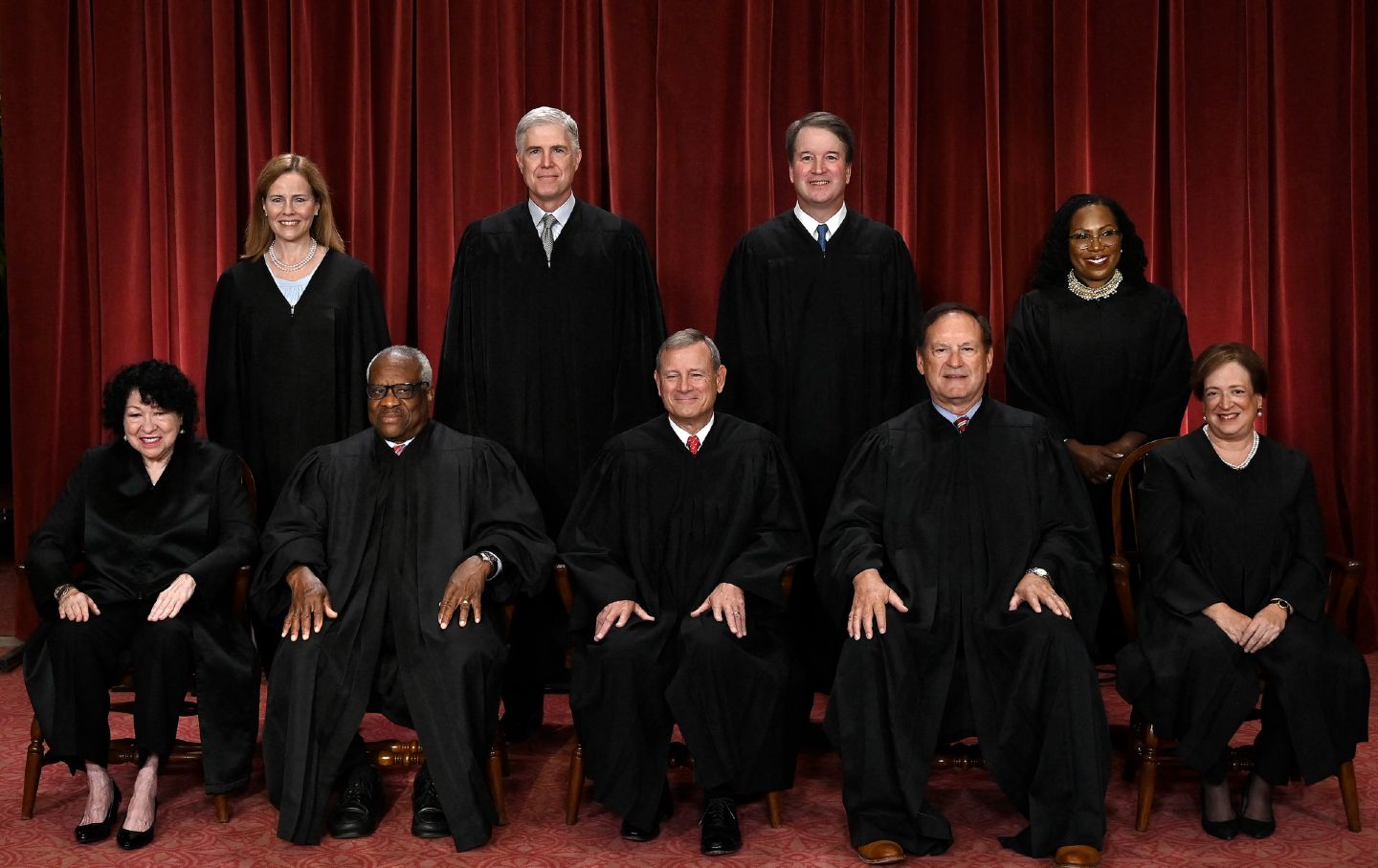
Justices of the US Supreme Court pose for their official photo at the Supreme Court Building in Washington, D.C., on October 7, 2022.
(Olivier Douliery / AFP via Getty Images)When Republican politicians try to take away abortion rights, they often lose. They lose special elections and ballot initiatives and maybe even presidential elections as punishment for their Christofascist overreach. But when the Supreme Court takes away these rights, nothing happens.
When elected officials take bribes or engage in corruption, they often lose; they get primaried or kicked off committees and sometimes face charges. But when Supreme Court justices engage in public corruption or take bribes, nothing happens.
When Donald Trump commits crimes… he generally gets away with it; still, people do, at least, try to hold him accountable, and he sometimes gets charged or impeached or made to pay hundreds of millions of dollars in fines. But when the Supreme Court helps Trump get away with his crimes, or at least helps him delay his reckoning until after the election—as it did earlier this week when it agreed to hear his claims for immunity from federal prosecution—nothing happens.
The Supreme Court must be made to pay a price—a political, institutional, professional price—for its ongoing political thuggery lightly disguised as jurisprudence. Its members will never stop acting like the only nine Americans who matter until we stop them from doing that. And the only way to stop them is to limit their power, their budgets, and their unearned belief in their own supremacy.
These people—and I’m including both the conservatives and the liberals here—act like they’re untouchable because that is how everybody else treats them. The nine justices are the nepo-babies of American democracy: They’ve earned nothing, yet act like they own the entire world. Every other institution in this country treats the Supreme Court with unfailing respect and total acquiescence to its power. Why? What have these people done to deserve the authority to wield power without question or resistance?
The problem starts with us, “the people.” We don’t bow down to presidents or congresspeople in this country. We straight-up harass politicians. We fight City Hall. Some people refuse to submit to the authority of cops and will read them the riot act about individual rights and who pays their salaries (note to fellow Black folks: Do not try this at home)—even though the cops are authorized to shoot challengers to their power. Yet the Supreme Court justices can waft through this country, giving rights to some, taking away rights from others, and the people just shrug. The court operates like a monarch, bestowing flowers on their favored champions and thorns on their enemies. Yet we treat these boons and reproaches as just and final. Protests are minimal and short-lived. The justices are allowed to go about the rest of their lives, more or less normally. These people receive less public heat than Taylor Swift. If I walked into a Costco with Chief Justice John Roberts, more people would recognize me, and nobody would get in John’s face over what he’s done.
The problem is aided and abetted by the elected branches of government. The Supreme Court has no army, but all presidents (except the last one) are willing to enforce the court’s rulings, even when those rulings are unmoored from reason or logic or fundamental fairness.
The Supreme Court has no ability to raise money, but Congress provides these people with a number of things the Constitution does not require it to, including a fancy courthouse, government clerks and staffers, and official-looking robes so the justices can cosplay as religious clergy. The government even pays for the dry cleaning, lest the blood of the children the court thinks must be sacrificed in the name of the Second Amendment should stain their costume.
But the court’s greatest institutional accomplice is the media, which largely insists on covering the nine law shamans as they wish to be covered, instead of as the unelected, unaccountable poison that enfeebles the rest of American democracy. Just the other day, The Washington Post ran an entire column on whether it’s “fair” to point out which party appointed the judges and justices who rule us. The column was inspired by a judge—who wished to remain anonymous, because these people are rank cowards—who was annoyed at being referred to as a Reagan-appointed judge, and complained to one of their media friends.
The Supreme Court moans and complains about its press coverage all the time, with justices like Samuel Alito and Amy Coney Barrett complaining with increasing intensity in recent years. It is insane to me that these people think they are entitled both to rule with supremacy and to receive favorable press, especially considering that the vast majority of the time the press does exactly what they want. The Supreme Court justices answer no questions they don’t want to be asked, sit for no interviews unless they are promoting a book, and do no public events other than ones where entire topics are predetermined as off-limits. The president can’t walk out onto his lawn without a gaggle of reporters waiting in the hedges to shout questions at him, and that’s despite having a dog that’s eager to chomp on a reporter’s ass if they get too close. But the press dutifully leaves the nine justices of the Supreme Court alone and allows them to speak only through their extremist, unhinged opinions and orders.
Consider this: Over the summer, the nine people who run an entire branch of government just disappear. They go on “vacation” and the press doesn’t follow them, doesn’t keep tabs on them, and doesn’t ask them to account for whatever fresh horror they have unleashed on the rest of us in June. Nobody even asks them whom they’re going to vote for in the fall, which is a question a much less important person like Mitt Romney gets asked 18 times before breakfast. It will take literally Pulitzer Prize–level reporting for us to find out who paid for the justices’ upcoming summer vacations, and we probably won’t know the answer until five years from now.
We treat the Supreme Court the way we do because people don’t understand how the court operates, and blithely assume there’s a valid reason for it. The people who do understand what the court is have made a political philosophy 101 decision: Tyranny is preferable to chaos. We bow and scrape to the Supreme Court because we fear that relieving it of its unearned power would lead our fractured country to open civil war. If the court does not get to decide which laws we live under, who does? Congress? What happens when Texas, or California, disagrees with Congress? What happens when Texas, or California, disagrees with the president? What happens when Congress or the president is just flat-out wrong? The threat of chaos always stalks democracy, and in our system we’ve allowed the Supreme Court to place itself as the final arbiter of our conflicts because we fear that the alternative is having our political conflicts be decided by strength of arms.
Count me in the camp of American feminist activist Jane Addams, who said, “The cure for the ills of democracy is more democracy.” The votes of nine people matter less to me than the votes of 330 million. If everybody were allowed to vote, if everybody’s votes counted equally, if the county weren’t gerrymandered into an antidemocratic pretzel, the people and not the court would be the final arbiter of our problems.
I came to this conclusion relatively late in life. You see, I am a liberal. Conservatives are more authoritarian-curious by nature, but I’ve found that liberals are the most eager to treat the antidemocratic Supreme Court as if it wears a laurel crown. That’s because liberals believe that some of our most cherished ideals about human rights and human dignity can be achieved only through a powerful high court with unquestionable authority. That’s the mistake I have been guilty of in the past. I have overemphasized Supreme Court rulings to, say, desegregate schools, while underestimating the importance of social movements, unyielding activism, and, frankly, the National Guard in forcing desegregation on a South that would never have just allowed Ruby Bridges to walk into a schoolhouse because of a ruling on a piece of paper.
All of this veneration of the Supreme Court must end if we are ever to rein in these justices. This court has proven with its actions—through one politically motivated decision after another—that it is unfit to wield the power that it does.
Popular
“swipe left below to view more authors”Swipe →As many have written, the court’s decision to delay Donald Trump’s trial, functionally indefinitely, is indefensible and a clear indication of political posturing instead of the swift application of justice. But that decision is just the latest in a decade-long string of rulings meant to help Republicans achieve their long-standing political goals. From abortion to voting rights, affirmative action, labor laws, gun laws, environmental regulations, financial regulations, public bigotry disguised as religion—it has been years since you needed to know anything about the law to predict the Supreme Court’s rulings: All you’ve needed to know was the stated position of the Republican Party to be able to predict with perfect accuracy what the Supreme Court would do. Most, if not all, of these policy initiatives are ones Republicans cannot enact through elections and legislation, so the Supreme Court comes in and decrees by fiat all that the Republicans cannot accomplish through democracy.
We cannot and must not be satisfied with our pretend-democracy that can be thrown out whenever five justices get together on a fishing boat with Leonard Leo. The first step toward stopping the Supreme Court’s political actions is to treat the justices as political actors and subject them to all of the scrutiny, pressure, and protest normal political actors face every day. The Constitution says they can keep their jobs for life, but it doesn’t say they get to enjoy them. It doesn’t say they get to lord over us like unapproachable gods. It doesn’t say they get to hide on Harlan Crow’s yacht while all us little people suffer under their yoke. Supreme Court justices should be treated with at least as much disrespect as any football stadium can give to Ted Cruz. The justices can be subjected to at least as much political coverage as the freaking New Hampshire primary.
The second step is to cut their power. Regular readers know that I am an advocate for court expansion, adding justices to the court to overcome the current extremist Republican supermajority. Court expansion does reduce the power of any individual justice, but it fundamentally leaves the court’s power intact. It’s more of a reform for the way the court wields power, not an attempt to change how much power it has. But there are ways to take away the court’s power. Jurisdiction stripping—the idea that certain laws should be explicitly removed from Supreme Court review—is one official way to take power away from these people.
Unofficially, we should stop giving every Supreme Court thought bubble the force and effect of law by dutifully enforcing whatever the justices come up with. I know that sounds radical. But I also know that an unjust law deserves no respect. If you want a benign, “nonpartisan” way to distinguish between legitimate Supreme Court rulings and ones that should be ignored, I have one: Rulings must be affirmed by at least one justice from both parties, or we should ignore it. It’s that simple. Both sides or GTFO. If the Supreme Court cannot come to some basically bipartisan agreement, then the ruling of the lower court stands (and if the lower courts did not come to some bipartisan agreement, then the ruling of the single-judge district court stands). If that leads to some circuits having different interpretations of federal law than others, so be it. Conservatives should be cool with it—they allegedly love “states’ rights,” don’t they?
If the Supreme Court is going to continue to act like a super-legislature, then we should start treating it like one. And that leads to the final step: Recognize that the Supreme Court is the enemy of democracy, not its protector, and start covering its justices that way. This is true for all of the justices, even the “liberal” ones I like and generally agree with.
As we saw with the court’s pathetic excuse for an “ethics” code, all nine of them think they are special. All nine of them think they are above the normal rules of participatory democracy. All nine of them think they have more in common with each other than they do with me or you, and think of themselves as “friends,” regardless of what they do to the country. All nine of them will defend each other whenever they are called to public accountability for their actions.
I think of the Supreme Court the way Batman thinks of Superman: an extremely powerful being who is untethered from the laws of physics and therefore must always be considered a threat to free society. Batman never falls for Kal-El’s space-copaganda and always has a plan to protect himself and his city just in case Clark gets super mad one day.
We must regard the Supreme Court with that level of skepticism. These people are not our friends; they are not here to help, and at any moment they can take from us that which we should value most: our ability to democratically govern ourselves. The court has been taking that away from us, fairly consistently, for the past 24 years, ever since it anointed George W. Bush as president in 2000 despite the fact that Bush lost the popular vote and likely would have lost the electoral count had all the votes (both undervotes and overvotes) been recounted in Florida. We failed to punish the court for its overreach then, and that failure has only emboldened the court to become what it is today.
Put simply: The Supreme Court must be stopped. We must use what little power the court still allows us to have to vote for people with the strength and wisdom to stop them. We must demand that our political leaders share with us their plans for stopping the court, in just the same way we demand to hear their plans to fix infrastructure or lower taxes.
To get there, all of us need to recognize how dangerous the court is. We are ruled by this court because we are too disunified and distracted to resist it. That has to end, because these nine people will not stop devouring democracy until there is none left to eat.
Thank you for reading The Nation
We hope you enjoyed the story you just read, just one of the many incisive, deeply-reported articles we publish daily. Now more than ever, we need fearless journalism that shifts the needle on important issues, uncovers malfeasance and corruption, and uplifts voices and perspectives that often go unheard in mainstream media.
Throughout this critical election year and a time of media austerity and renewed campus activism and rising labor organizing, independent journalism that gets to the heart of the matter is more critical than ever before. Donate right now and help us hold the powerful accountable, shine a light on issues that would otherwise be swept under the rug, and build a more just and equitable future.
For nearly 160 years, The Nation has stood for truth, justice, and moral clarity. As a reader-supported publication, we are not beholden to the whims of advertisers or a corporate owner. But it does take financial resources to report on stories that may take weeks or months to properly investigate, thoroughly edit and fact-check articles, and get our stories into the hands of readers.
Donate today and stand with us for a better future. Thank you for being a supporter of independent journalism.
More from The Nation
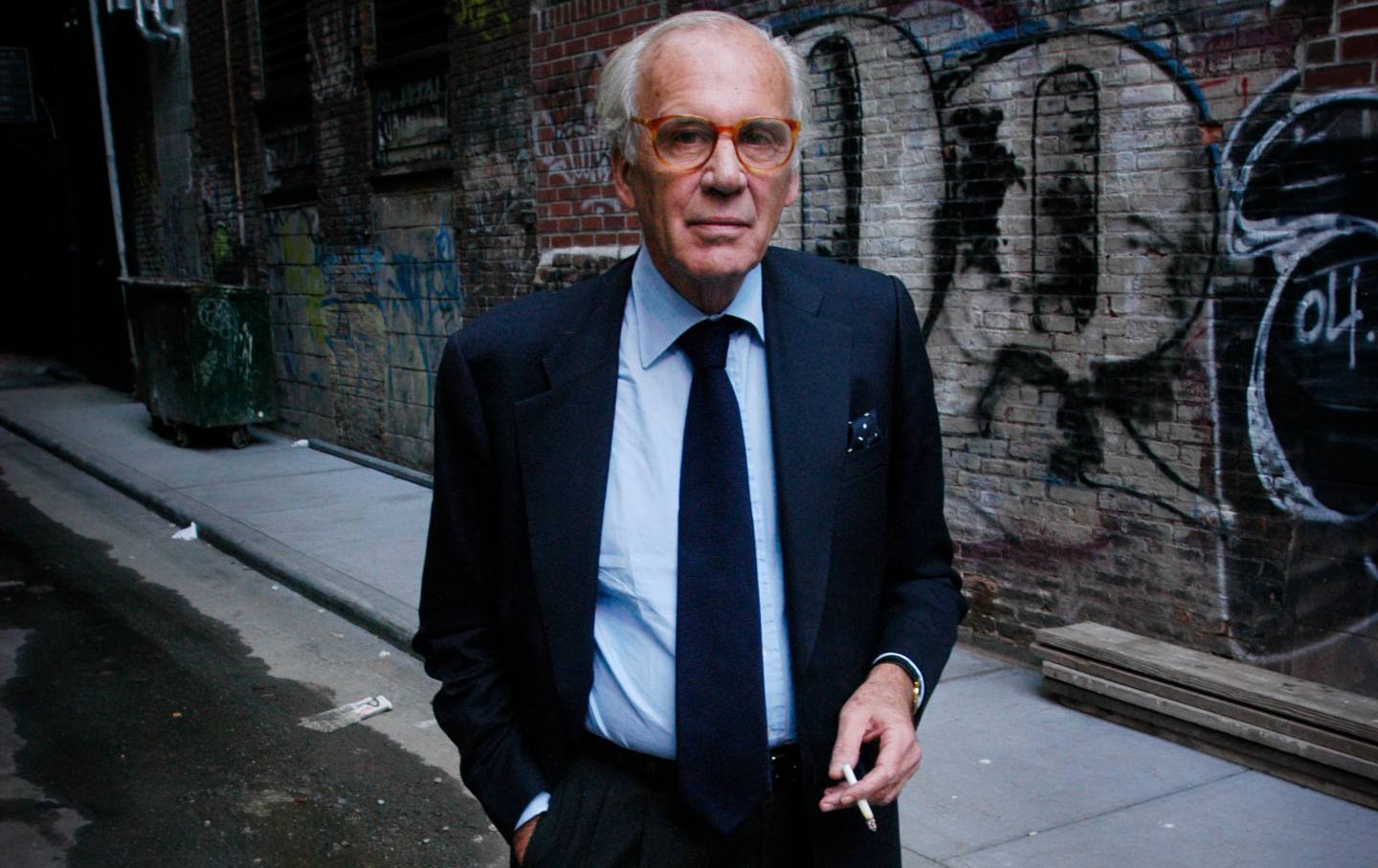
Lewis Lapham Salvaged From History What Was Useful, Beautiful, and True Lewis Lapham Salvaged From History What Was Useful, Beautiful, and True
Writer Lewis H. Lapham, longtime editor of Harper’s Magazine and the founder of Lapham’s Quarterly, died in Rome. He was 89.
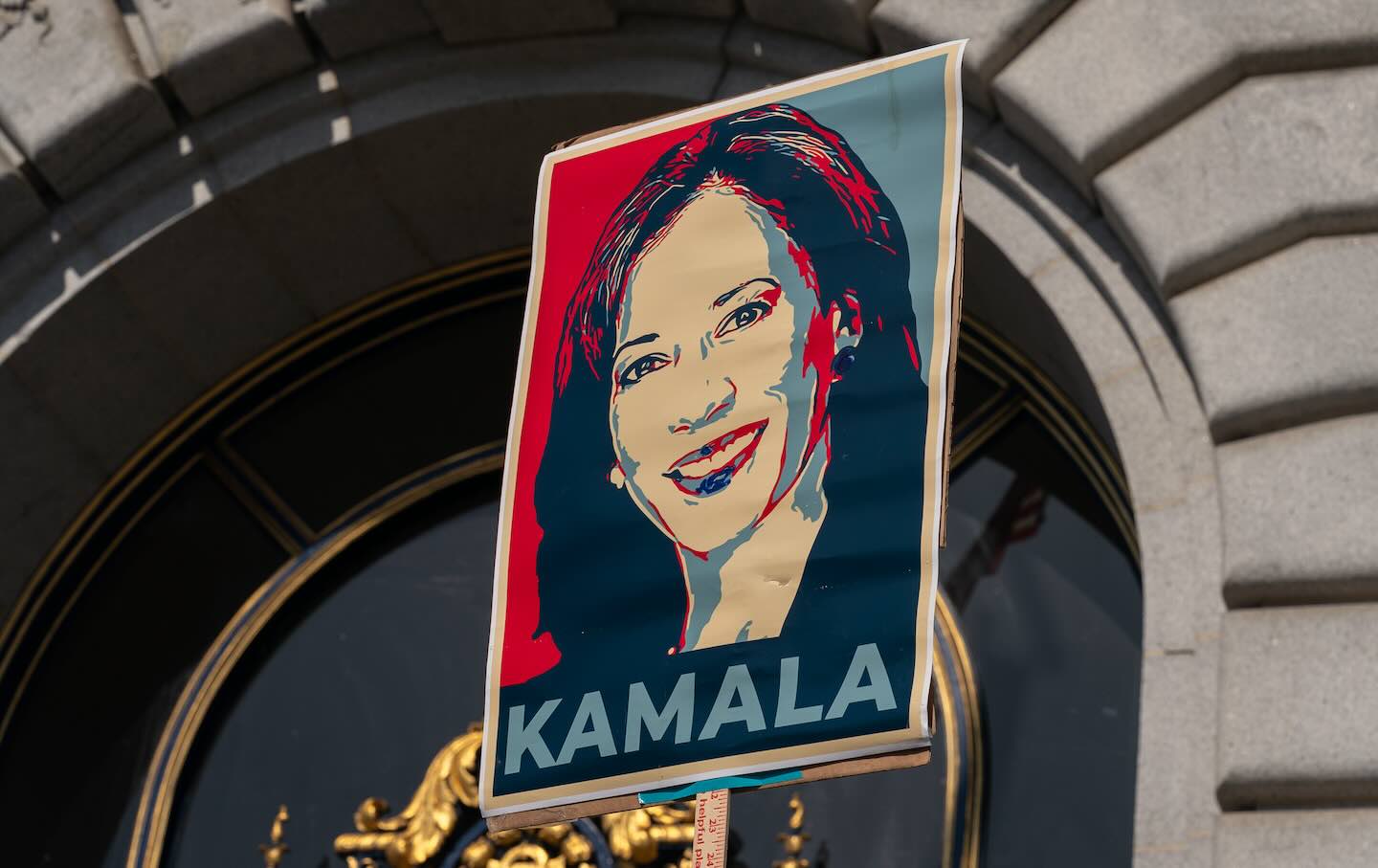
Working Families Party Nominates Kamala Harris Ahead of the DNC Working Families Party Nominates Kamala Harris Ahead of the DNC
The nomination gives the presumptive Democratic presidential nominee a second ballot line in New York and a big organizational boost from WFP and its allies.

Kamala Harris Will Shift on Gaza Only if We Make Her Kamala Harris Will Shift on Gaza Only if We Make Her
The vice president’s ascension provides an opening for a new approach to the horror in Palestine. But it won’t happen without sustained political pressure.
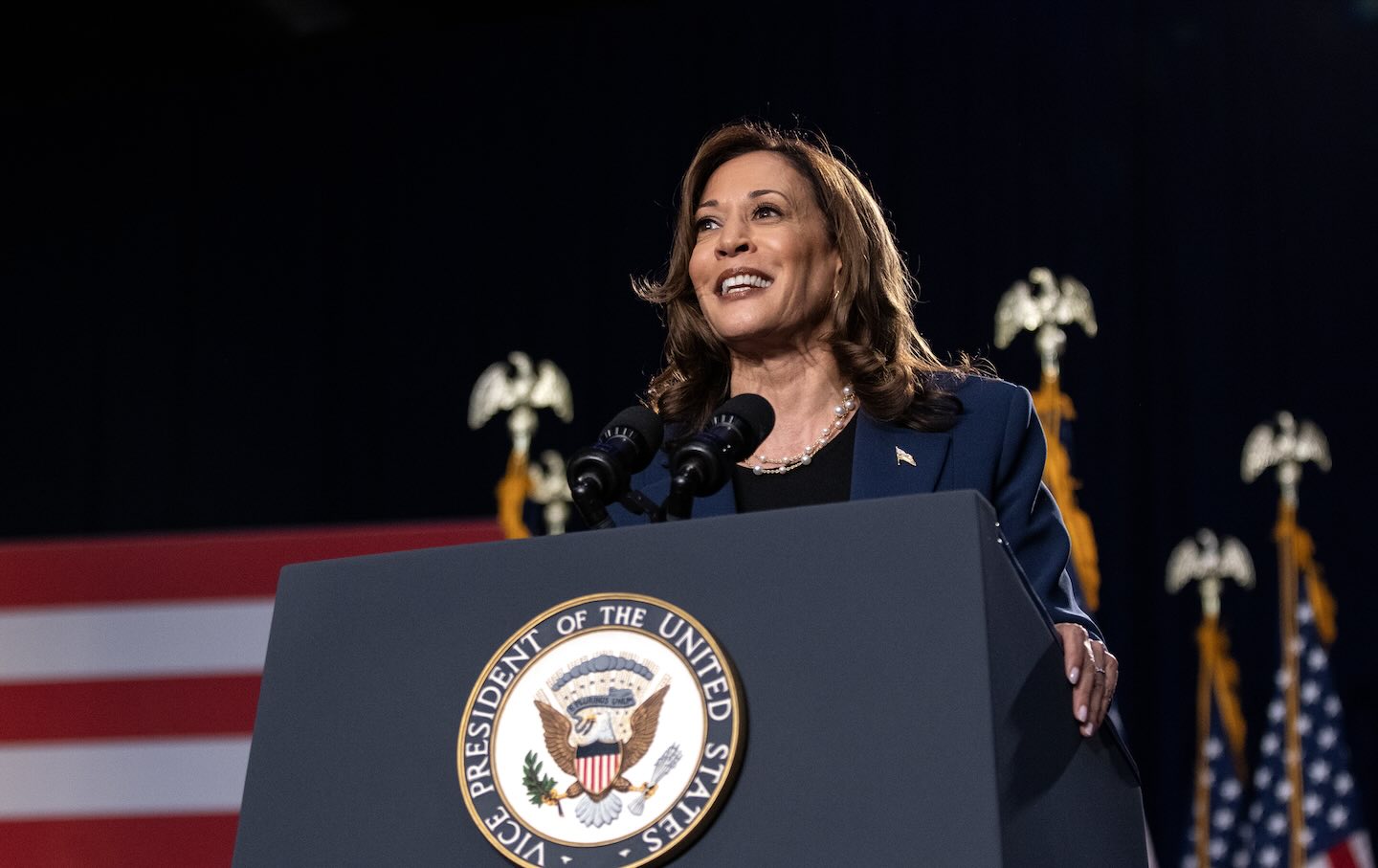
Kamala Harris Is Ready for This Fight Kamala Harris Is Ready for This Fight
In a matter of days, Vice President Kamala Harris cleared the path for the Democratic presidential nomination.
Editorial / John Nichols for The Nation
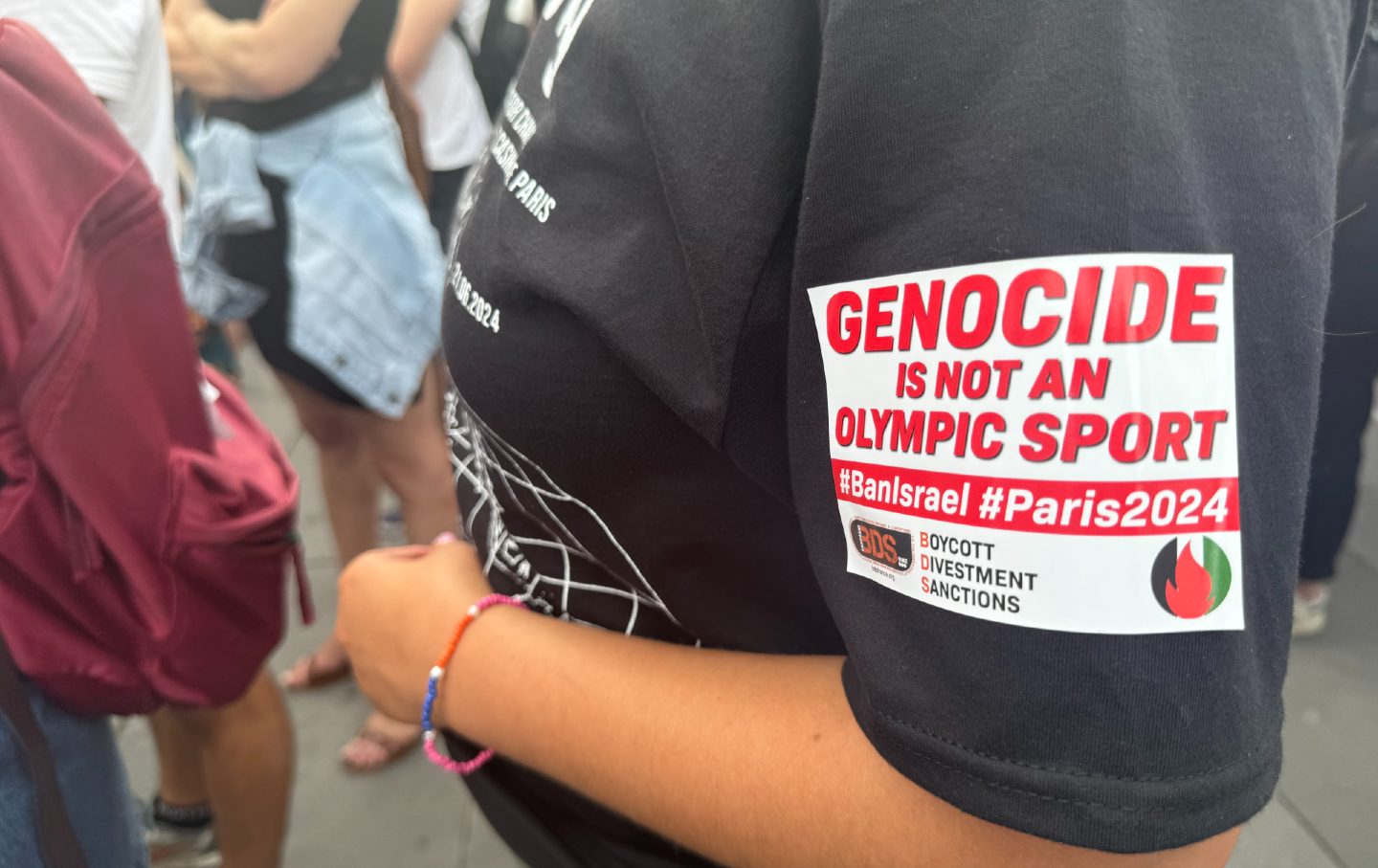
The Paris Olympics Are Kicking Off With Protests The Paris Olympics Are Kicking Off With Protests
“The Olympic Games are profoundly disrupting the lives of French people,” the protesters wrote in a joint statement.“The question then arises: Who benefits from the Games?”
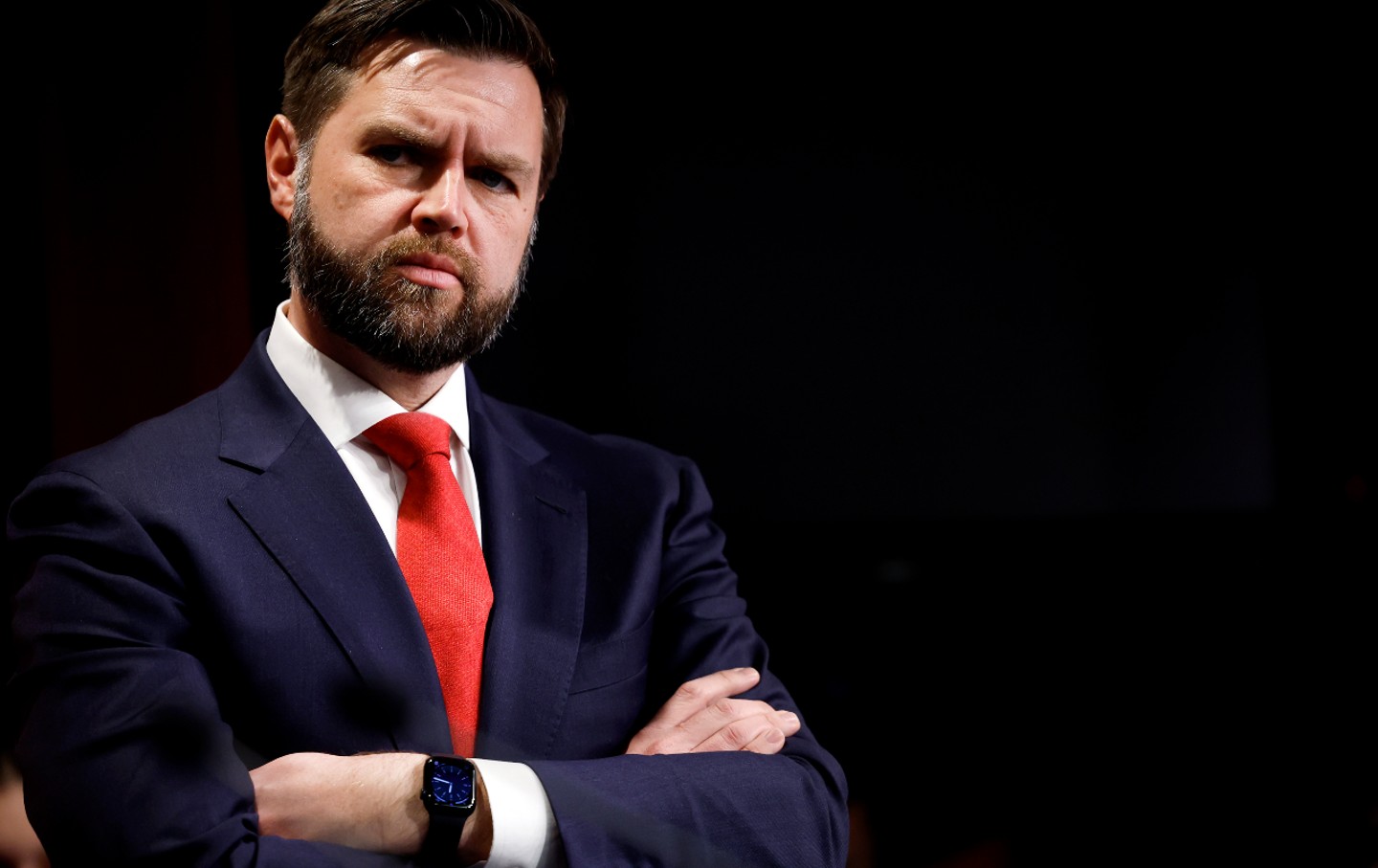
J.D. Vance’s Hatred of Cat Ladies Is Weirder and More Dangerous Than You Think J.D. Vance’s Hatred of Cat Ladies Is Weirder and More Dangerous Than You Think
Patriarchy, plutocracy, and ethnonationalism fuel the vice-presidential candidate’s bizarre slur.


